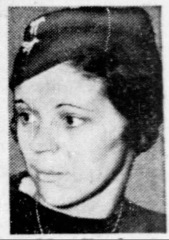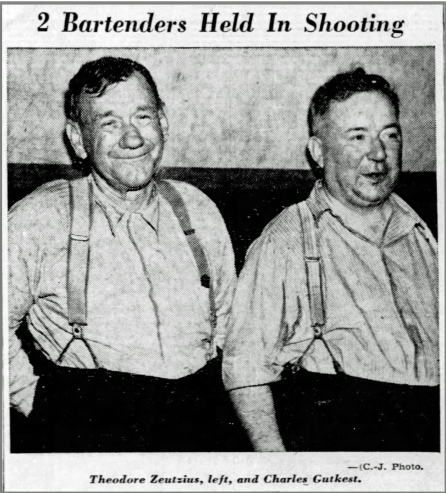Charles Elmer “Curley” Fowler was my second cousin once removed, born on November 2, 1909, in Louisville, Kentucky. He was the oldest child of Charles Anthony Fowler, a Louisville police patrolman, and Mamie Doerr Fowler. Curley married the pretty Etta Mae Shepherd, had one child and was awaiting the birth of the second in 1938.

Etta Mae Fowler
Curley was employed by the Standard Sanitary Manufacturing Company as an inspector, but his avocation and part-time vocation was in the wrestling and boxing ring. He fought about twenty professional boxing matches as a welterweight and in 1937 was appointed by the State Boxing Commissioner to be a referee. The Louisville Courier-Journal reported that in February 1938, Fowler ordered “Kingfish” Levinsky from the ring because “Levinsky didn’t look as if he knew how to wrestle.” He also officiated at two bouts on the 1938 Derby Eve boxing card at the Armory.
I don’t know whether it was on account of the “Kingfish” ruling or some other dispute, but twelve days after the Derby, on May 19, 1938, Curley was shot and killed in the front yard of his South Preston Street home. He was 28 years old.
On the Thursday in question, Curley went down the street to the Preston Inn, where Theodore Zeutzius and Charles Gutkest were tending bar, drinking as well as serving. An argument erupted, and it was reported that Curley knocked Zeutzius down, then left the tavern and walked back home. About an hour later, Zeutzius and Gutkest arrived at the Fowler home to continue the fracas. Gutkest had a blackjack, or club, at the ready but was not seen to have used it. Zeutzius was brandishing a firearm.
It just happened that two Louisville policemen were on patrol in the area. One of them, Patrolman W. H. Seward said he saw Fowler leaning on the fence facing Zeutzius and Gutkest. “I couldn’t hear what they were saying but all of a sudden Zeutzius struck Fowler in the face. ‘Wait a minute, here’s a fight,’ I told my partner, and right away, bang went the gun,” he said. Both of the policemen and Etta Mae told the coroner’s jury that Curley was backing away, making no effort to fight, when the shot was fired.
Curley was shot in the groin and the bullet severed an artery. Patrolman Seward succeeded in stopping the blood flow and commandeered a passing car to take Fowler to St. Joseph’s Infirmary.
Zeutzius was arrested on charges of malicious shooting with intent to kill, carrying concealed a deadly weapon and conspiring to intimidate. Gutkest was charged with the latter two offenses.

The Courier-Journal kept readers informed of Curley’s medical status, at one point indicating he was on the road to recovery. A charity boxing match was held at the armory to raise funds for the Fowler family. But the severe wound necessitated the amputation of Curley’s leg several inches above the knee, and on June 18, almost exactly one month after the shooting, Curley died. After the death, Zeutzius was charged with murder and Gutkest was charged with being an accessory to murder.
Theodore Zeutzius was offered a plea deal — plead guilty and take a term of five years, with three probated. He declined the offer and decided to take his chances with a jury. The trial in the case of Commonwealth v. Zeutzius took place several months later, and on December 3, 1938, the front-page headline of the Courier-Journal announced “Tavern Keeper Given 10 Years In Slaying.” The jury deliberated one hour before returning its verdict — they didn’t buy the defendant’s argument that he shot in self-defense and/or that “he was dazed from the blows inflicted by Fowler and didn’t know he had shot the boxer.”
In 1939, Zeutzius appealed his conviction on the grounds that the judge had failed to instruct the jury on the law of self-defense and on the defendant’s drunkenness at the time of the offense. The appellate court affirmed the original judgment because there had, in fact, been a jury instruction relating to self-defense; as to whether the defendant had been so drunk that he did not know what he was doing or was incapable of entertaining felonious intent, the court pointed to Zeutzius’s trial testimony:
“Q. Were you drunk at the time of this trouble? A. No, sir.
“Q. Are you positive of that? A. I was drinking. I was not drunk.”
It appears that Zeutzius served out his sentence in the state penitentiary. According to the Louisville City Directory, he was employed as a helper at a manufacturing company at some point in 1949; he died on August 16, 1949.
The murder charges against Charles Gutkest were dismissed in January 1939, the month after Zeutzius’s trial. He died in Louisville on December 15, 1950.
Etta Mae Fowler was employed in 1942 as a wrapper at Stehlin’s Bakery. I have been unable to find any later information about her or the children. Perhaps some of my Louisville cousins will know “the rest of the story.”
I am the son of Charles Elmer Fowler unborn son Charles Elmer McDonogh adopted name by Mr. McDonogh who married my Grandmother Etta Mae. Charles Elmer Fowler would have been my Grandfather. You can reach me at cpmcdonogh@gmail.com
LikeLike
Thank you for giving a little more of “the rest of the story.” I hope Etta Mae and her children fared well in life after Curley’s tragic death.
LikeLike
I am the granddaughter of Charles Elmer Fowler. He was married to my grandmother,
Mary Josephine Steinmetz for about 4 or 5 years. He had two children with her-my mother Shirley Mae Fowler Kleier and her brother Donald Fowler. My mother died in 2013, but Don is still alive. Neither my mother nor her brother had any contact with Charles Elmer Fowler or Elmer, as she called him or his family in Brandenburg.
LikeLike